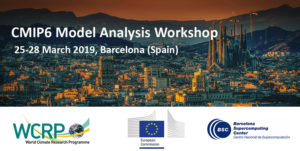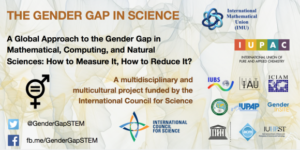Dates: 25-28 March 2019
Place: Barcelona Supercomputing Center (BSC), Barcelona (Spain)
The workshop is jointly organized by the WCRP Working Group on Coupled Modelling (WGCM) CMIP Panel and the European Commission Horizon 2020 projects PRIMAVERA (PRocess-based climate sIMulation: AdVances in high-resolution modelling and European climate Risk Assessment) and EUCP (EUropean Climate Prediction system).
Following the format of the WCRP CMIP5 model analysis workshop held in 2012, the workshop focus will be on:
• Multi-model CMIP6 analyses and evaluation that take advantage of the large suite of CMIP6 experiments
• Efforts to connect model development and analysis to identify Earth system model improvements that help reduce systematic biases and/or increase the realism of models
• Methods for multi-model analysis
• Climate change impacts
The workshop will be structured around the three scientific questions:
1. How does the Earth system respond to forcing?
2. What are the origins and consequences of systematic model biases?
3. How can we assess future climate change given climate variability, predictability, and uncertainty in scenarios?
Workshop approach: Short-presentation/poster format
The workshop will consist of a series of seven half-day sessions of three hours each. Each session will begin with 20-25 presenters given a 3-minute time slot to show no more than one slide summarizing the main conclusions of their poster. The rest of the half-day session will consist of viewing posters of that session. In addition, there will be a plenary talk each day.
Participation is limited by the size of the venue (~200 people) and format of the workshop. Abstracts will be accepted based on relevance to the workshop focus.
Timeline
• Abstract submission opens: 15 September 2018
• Abstract submission deadline: 15 November 2018
• Abstract / Participation acceptance: 15 December 2018
More information on the workshop will be made available at https://www.wcrp-climate.org/modelling-wgcm-meetings.
Hope to see you in Barcelona next year!
Best wishes,
Scientific Organizing Committee of the Workshop
Veronika Eyring, Greg Flato, Jean-Francois Lamarque, Jerry Meehl, Cath Senior, Ron Stouffer, and Karl Taylor (CMIP Panel), Francisco J. Doblas-Reyes (EUCP), Malcolm Roberts (PRIMAVERA)



